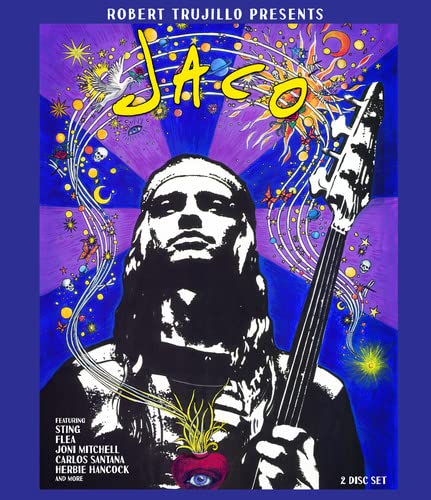
“It’s not about bass playing, it’s about being a storyteller.”
The documentary Jaco traces the life of iconic jazz bassist Jaco Pastorius, from his childhood in Florida and first gigs as a teenager to his innovative style of bass playing, work with Weather Report, and his untimely death at age 35.
Metallica bassist Robert Trujillo, the documentary’s producer, saw Weather Report in 1979, and the experience helped mold his own musical journey. Jaco compiles archival footage, home movies, personal photos and interviews to form a balanced and compassionate look at the groundbreaking musician’s life.
Directed by Paul Marchand and Stephen Kijak, this straightforward documentary has no central narrator and is told through interviews with family, friends, bandmates, and record company execs, including Joni Mitchell, Carlos Santana, Herbie Hancock, Lenny White, and Wayne Shorter. The “celebrity” bassist interviews are short, but offer valuable insight into how Jaco’s bass playing influenced an eclectic group of rock, R & B, and jazz musicians since his first solo album, Jaco Pastorious, was released n 1975.
Born and raised in a small town near Ft. Lauderdale, Jaco was destined to be a musician. Drums were his first instrument of choice, but he soon moved on to the upright bass, and finally the electric bass, which he fashioned into a fretless bass (nicknamed “The Bass of Doom”). His dad, Jack, a Sinatra-channeling lounge singer, was on the road most of the time, leaving Jaco’s mom to take care of Jaco and his brother. Ironically, Jaco’s heavy touring schedule caused his divorce from his first wife, Tracy. There’s a treasure trove of home movies from Jaco’s childhood and his first marriage to document this time of his life, giving the documentary a real sense of him as a family man, not just a musician.
Following a few gigs with local bands as a teen, Jaco joined Wayne Cochran and the C.C. Riders, touring non-stop with the stomping blues-rock revue. Blood, Sweat and Tears drummer Bobby Columbo got Jaco his first record deal. “I walk into Columbia Studios,” recalls Peter Graves, a jazz musician friend of Jaco’s from Florida, “and I see Hubert Laws and Lenny White. Jaco’s eye lit up, because he knew this was the level he belonged on.”
His eponymous debut album revolutionized jazz bass playing and gave him a buzz among his fellow musicians, but that was just the start. After a Weather Report concert, in he introduced himself to the band’s co-founder Joe Zawinul by saying, “My name is John Francis Pastorius III. I’m the greatest bass player in the world”
“Get the f…k out of here” was Zawinul’s response. The next day, Jaco auditioned and he soon took over as Weather Report’s bass player. This began Weather Report (and Jaco’s) ascendancy to the height of the jazz-fusion world, as the band consistently sold out shows and brought jazz to a mainstream audience.
Throughout the mid-’70s to early ‘80s, Jaco worked on many side projects. He played on Ian Hunter’s All-American Alien Boy album, (“He had an enormous ego, but innocent,” remembers Hunter) and recorded and toured with Joni Mitchell. When an unnamed bass player took umbrage at Joni’s weird arrangements, he recommended she contact Jaco by saying, “There’s this weird guy in Florida. You’d probably like him.” (Fellow Floridian Pat Metheny, who is noticeably absent from this documentary, also recorded and toured with Mitchell.)
During a tour of Japan, Jaco’s behavior, which had always been eccentric, took a turn for the worse, and he left Weather Report. He signed a solo deal with Warner Brother Records and moved to Manhattan.
Warner Brothers wanted a hit fusion record, but instead they got the adventurous Word of Mouth with the frenetic “Crisis” as the opening cut. Warner Brothers declined to release the second album he recorded for them. The musical inventiveness that had catapulted Jaco into the spotlight, now threatened to destabilize him, as Warner Brothers dropped him.
He spent much of his time in Manhattan hanging out with other musicians at an apartment dubbed “55 Gram”, and a friend found Jaco begging on the streets of New York City. The NYC Jaco was known as much for his erratic behavior as his musicianship, with casual fans expecting him to live up to his crazy reputation, like the John Belushi of jazz. These antics seemed like harmless fun to his legion of admirers, but served as a red flag to those closest to him. Joni Mitchell remembers encountering a disheveled Jaco playing at a dive in Manhattan, with only a handwritten cardboard sign to announce the show.
Although he was diagnosed as bipolar and received treatment at Bellevue, Jaco drifted to his South Florida hometown after he was released, sleeping in parks, drinking, and losing the battle with his demons. Tragically, he was beaten to death by a nightclub manager during an altercation in a Fort Lauderdale club. (The club manager only served a few months in prison for manslaughter.)
The second DVD in this 2-DVD set includes unedited outtakes, anecdotes and stories from the interviewees. A soundtrack CD with music featured in the film is available from Legacy Recordings.
Trujillo’s admiration for Jaco is shared by other rock and funk bassists interviewed in the documentary. Bootsy Collins, Flea, Sting, Geddy Lee, Juan Alderete (Mars Volta) give testimonials about Jaco’s musical influence. Says Bootsy Collins, “It made us think, if he could do that… maybe we could do this…”